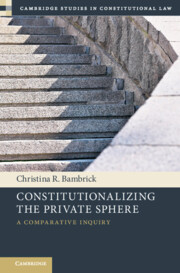Refine search
Actions for selected content:
9 results
8 - Conclusion
- from Transformation
-
- Book:
- Constitutionalizing the Private Sphere
- Published online:
- 23 January 2025
- Print publication:
- 06 February 2025, pp 271-278
-
- Chapter
- Export citation
3 - The United States
- from Equality
-
- Book:
- Constitutionalizing the Private Sphere
- Published online:
- 23 January 2025
- Print publication:
- 06 February 2025, pp 63-100
-
- Chapter
- Export citation
7 - The European Union
- from Transformation
-
- Book:
- Constitutionalizing the Private Sphere
- Published online:
- 23 January 2025
- Print publication:
- 06 February 2025, pp 243-270
-
- Chapter
- Export citation
1 - Introduction
-
- Book:
- Constitutionalizing the Private Sphere
- Published online:
- 23 January 2025
- Print publication:
- 06 February 2025, pp 1-15
-
- Chapter
- Export citation
4 - India
- from Equality
-
- Book:
- Constitutionalizing the Private Sphere
- Published online:
- 23 January 2025
- Print publication:
- 06 February 2025, pp 101-142
-
- Chapter
- Export citation
6 - South Africa
- from Transformation
-
- Book:
- Constitutionalizing the Private Sphere
- Published online:
- 23 January 2025
- Print publication:
- 06 February 2025, pp 188-242
-
- Chapter
- Export citation
5 - Germany
- from Transformation
-
- Book:
- Constitutionalizing the Private Sphere
- Published online:
- 23 January 2025
- Print publication:
- 06 February 2025, pp 148-187
-
- Chapter
- Export citation
2 - A Republican Vein in Liberal Constitutionalism
-
- Book:
- Constitutionalizing the Private Sphere
- Published online:
- 23 January 2025
- Print publication:
- 06 February 2025, pp 16-58
-
- Chapter
- Export citation

Constitutionalizing the Private Sphere
- A Comparative Inquiry
-
- Published online:
- 23 January 2025
- Print publication:
- 06 February 2025
